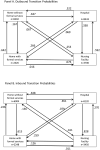Transitions in Care in a Nationally Representative Sample of Older Americans with Dementia
- PMID: 26200764
- PMCID: PMC4834213
- DOI: 10.1111/jgs.13540
Transitions in Care in a Nationally Representative Sample of Older Americans with Dementia
Abstract
Objectives: To describe transitions in care for older adults with dementia identified from a nationally representative cohort and to describe transition rates in those with more-severe levels of cognitive and functional impairment.
Design: Longitudinal cohort study.
Setting: Health and Retirement Study (HRS).
Participants: HRS respondents aged 65 and older whose survey data were linked with Medicare claims from 1999 to 2008 (N = 16,186).
Measurements: Transitions in care between home, home with formal services, hospital, and nursing facility care; cognitive function; activities of daily living; and mortality.
Results: The 3,447 (21.3%) HRS subjects who were ever diagnosed with dementia experienced frequent transitions. Of subjects transitioning from a hospital stay, 52.2% returned home without home care services, and 33.8% transitioned to a nursing facility. Of subjects transitioning from a nursing facility, 59.2% transitioned to the hospital, and 25.3% returned home without services. There were 2,139 transitions to death, and 58.7% of HRS subjects with dementia died at home. Even in persons with moderate to severe dementia, multiple transitions in care were documented, including transitions from the hospital to home and back to the hospital.
Conclusion: In this nationally representative sample of older adults, subjects diagnosed with dementia experience frequent transitions. Persons with dementia who are cared for at home and who transition back to home often have moderate to severe impairments in function and cognition.
Keywords: dementia; elder care; transitions.
© 2015, Copyright the Authors Journal compilation © 2015, The American Geriatrics Society.
Figures

References
-
- Workgroup on NAPA's scientific agenda for a national initiative on Alzheimer’s disease Alzheimer's & Dementia. 2012;8(4):357–371. - PubMed
Publication types
MeSH terms
Grants and funding
LinkOut - more resources
Full Text Sources
Other Literature Sources
Medical

